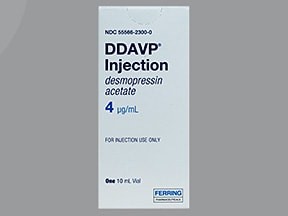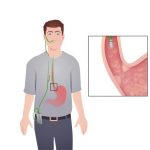
desmopressin – injection, DDAVP
Medication Uses Side Effects Precautions Drug Interactions Overdose Notes Missed Dose Storage Uses: Desmopressin controls urine production in individuals with "water diabetes" (diabetes insipidus) or certain head injuries or brain surgeries. It replaces vasopressin, a substance that the body lacks in these conditions. Desmopressin also helps control bleeding in individuals with hemophilia A or type 1 von Willebrand’s disease. It enhances normal blood clotting. How to Use: This medication is administered via injection into a vein or under the skin by a healthcare professional. For increased thirst and excessive urination, it is usually given twice a day or as directed by a doctor. If using at home, follow preparation and usage instructions provided by a healthcare professional. Use regularly at the same times each day to optimize the benefits. Check the medication visually for particles or discoloration before use, and do not use if present. Safely store and discard needles and medical supplies. Limit fluid intake, especially in children and older adults, and consult a doctor for details. Follow the prescribed dosage and inform your doctor if the condition does not improve or if the medication stops working effectively. Side Effects: Possible side effects include headache, nausea, upset stomach, flushing, and redness/pain/swelling at the injection site. Desmopressin can infrequently affect blood pressure and may cause dizziness and a fast heartbeat. Notify your doctor if you experience changes in blood pressure or any related symptoms. Serious but rare side effects may occur, such as low sodium levels, allergic reactions, chest pain, weakness on one side of the body, slurred speech, and sudden vision changes. Seek immediate medical attention if necessary. This is not a complete list of possible side effects, so contact your doctor or pharmacist if you notice any other effects.
Precautions: Inform your doctor or pharmacist of any allergies to desmopressin or other ingredients in the product. Do not use if you have certain medical conditions or a history of low sodium in the blood. Before using, disclose your medical history, especially if you have high or low blood pressure, heart disease, conditions that increase your risk of fluid/mineral imbalance, a history of blood clots, or if you have recently become dehydrated. This medication may cause dizziness, so avoid activities that require alertness until certain. Inform your doctor if you develop an illness causing water/mineral imbalance or need to drink more fluids. This drug may affect older adults more significantly due to declining kidney function. Use during pregnancy and breastfeeding should be discussed with your doctor. Drug Interactions: Keep a list of all products you use and inform your doctor and pharmacist. Desmopressin may interact with other medications, such as narcoeptic pain relievers, nonsteroidal anti-inflammatory drugs, psychiatric medicines, drugs to treat seizures, SSRI antidepressants, tricyclic antidepressants, and diuretics.
Question
Overdose: If overdose is suspected, contact a poison control center or emergency room immediately. US residents can call their local poison control center at 1-800-222-1222. Canada residents can call a provincial poison control center. Symptoms of overdose may include confusion, drowsiness, persistent/severe headache, and sudden weight gain. Notes: Do not share this medication with others. Periodic laboratory and/or medical tests may be performed to monitor progress and check for side effects. Consult your doctor for more details. Missed Dose: If you miss a dose, use it as soon as you remember. If it is near the time of the next dose, skip the missed dose and resume your usual dosing schedule. Do not double the dose. Storage: Store this medication in the refrigerator between 36-46 degrees F (2-8 degrees C). Do not freeze. Keep all medicines away from children and pets. Do not flush medications down the toilet or pour them into a drain. Properly discard this product when it is expired or no longer needed. Consult your pharmacist or local waste disposal company for more details on safe disposal. Information last revised December 2013. Copyright(c) 2013 First Databank, Inc.


